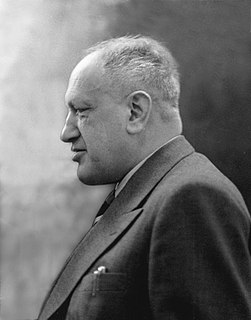A Quote by Richard Dawkins
Einstein was adamant in rejecting all ideas of a personal god.
Related Quotes
Einstein has a feeling for the central order of things. He can detect it in the simplicity of natural laws. We may take it that he felt this simplicity very strongly and directly during his discovery of the theory of relativity. Admittedly, this is a far cry from the contents of religion. I don't believe Einstein is tied to any religious tradition, and I rather think the idea of a personal God is entirely foreign to him.
If we are in Christ the whole basis of our goings is God, not conceptions of God, not ideas of God, but God Himself. We do not need any more ideas about God, the world is full of ideas about God, they are all worthless, because the ideas of God in anyone’s head are of no more use than our own ideas. What we need is a real God, not more ideas about Him.
I believe in you and me. I'm like Albert Schweitzer and Bertrand Russell and Albert Einstein in that I have a respect for life -- in any form. I believe in nature, in the birds, the sea, the sky, in everything I can see or that there is real evidence for. If these things are what you mean by God, then I believe in God. But I don't believe in a personal God to whom I look for comfort or for a natural on the next roll of the dice.
Einstein uses his concept of God more often than a Catholic priest. Once I asked him:
'Tomorrow is Sunday. Do you want me to come to you, so we can work?'
'Why not?'
'Because I thought perhaps you would like to rest on Sunday.'
Einstein settled the question by saying with a loud laugh: 'God does not rest on Sunday either.'
I discovered Einstein said the same thing about his celebrated theories of relativity that writers say about their work when he said he didn't have any feelings of personal possession of these ideas. Once they were out there, they came from somewhere else. And that's exactly the feeling when you write. You don't feel possessive about it.
It is one of the ironies of religious history that many mortals err in their understanding of the nature of God and end up rejecting not the real God but their own erroneous and stereotypical image of God. Frequently this is because they have thought of God solely in terms of thunderings at Sinai without pondering substance. . . .
Two radical ideas have been introduced into human thought. One of them is that energy and matter are pretty much the same sort of stuff. That's Einstein. The other is that revenge is a bad idea. Revenge is an enormously popular idea but, of course, Jesus came along with the radical idea of forgiveness. If you're insulted, you have to square accounts. So this invention by Jesus is as radical as Einstein's.


































